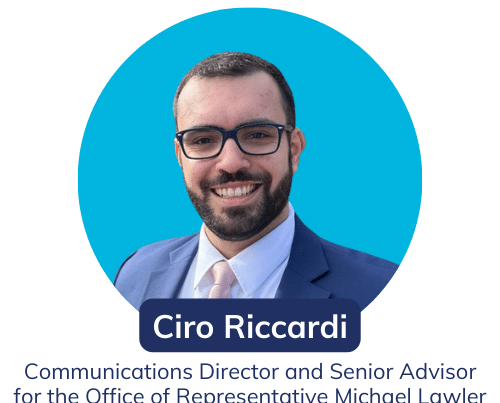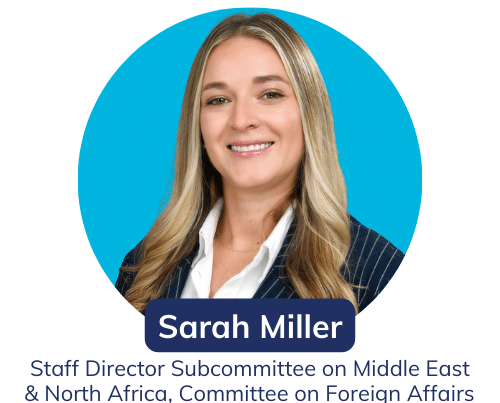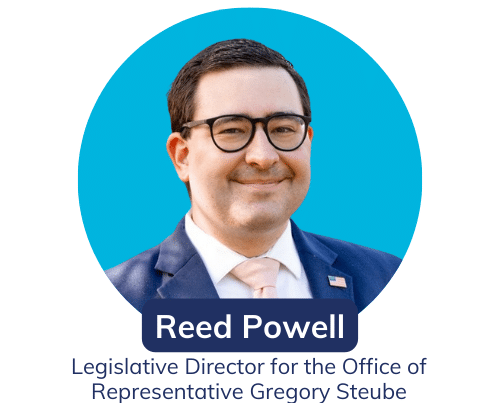
G. James Herrera
- Sole congressional staffer covering U.S. Defense Readiness & Infrastructure Policy Analysis heads to U.S. Air Force
- There are now two positions open to fill this role. Knowledge requirements = industry + military expertise + legislative process
- CRS applies practicality and technical expertise to bills— what’s feasible, what’s a dream, what are the unintended consequences; what are the statutory impediments and existing policies and practices in place
- Higher congressional staff turnover increases CRS value, since it is Congress’s trusted advisor on matters that require institutional knowledge and familiarity with complex and nuanced processes
- Modernizing the delivery of information to the next generation of staffers, including CRS staffers is key
G. James Herrera, who was until last week the U.S. Defense Readiness & Infrastructure Analyst at the Congressional Research Service (CRS), is now head of legislative affairs for Air Force Education and Training Command. CRS, while a small organization, has meaningful impact when it comes to turning policy ideas into real plans — providing subject matter expertise to determine what it takes to execute a plan, step-by-step, for each House and Senate office, as well as the committees.
Leadership Connect spoke with Herrera to get an insider’s view on the functions of CRS, and what it will take to continue evolving the process of educating its staff, new and seasoned. The transfer of institutional knowledge is facing shorter timelines in both the public and private sectors. Imagine walking into a new job and actually having a solid playbook to make your onboarding seamless and quick, so you can get to adding your sauce to the pot. Sometimes it takes a bird’s-eye view to tackle issues like this.
Herrera used to work at a Department of Defense (DOD) think tank, the Institute for Defense Analyses, performing research and publishing studies on a variety of readiness and infrastructure issues for the Office of the Secretary of Defense, the combatant commands, and the military services. This included opportunities to work with the White House’s Office of Science and Technology Policy through two Presidential administrations, and with former Defense Secretary James Mattis‘ Close Combat Lethality Task Force. Having gained knowledge on readiness issues at the most senior levels of government, Herrera then went to CRS, where members of Congress and their staff can reach out for subjective, non-partisan subject-matter expertise. CRS also supports committees in evaluating reports and data that are provided by the executive branch to Congress.
How does Congress use CRS? What is its value to a staffer on Day 1 or Day 50?
It’s a voluntary ask, and typically when the subject is more technical in nature, or it’s an area that they’re unfamiliar with, they’ll reach out to CRS. This includes Members and staff from the committees, as well as individual congressional offices. They’ll reach out to CRS and they’ll say, ‘Hey, we’ve got a piece of legislation, or we have an idea for legislation and we’d like you to help us craft that.’ Most of the time, it’s providing a balance of options, but it’s also impact. ‘If I write this piece of legislation, what is the actual downstream impact of enacting that legislation?’ Understanding the downstream effects of legislation isn’t always apparent. You need someone who’s familiar with the current systems and processes, and with the applicable laws. So you can say:
If you were to enact this piece of legislation, this is what actually happens by the time it reaches [for example], the Installation Commander at a particular military base.
With Herrera moving on, filling his role may get a little complicated, since you need an individual with politically-enhanced industry knowledge — finding someone with sector experience who has the familiarity with Congress and the legislative process, so that you can actually provide answers that are actionable and useful to a Member.
What are the requirements for a CRS Analyst?
They are very broad ranging, but generally require a lot of knowledge in your field of expertise and/or the legislative process. It’s great when an analyst comes to CRS with both, but typically there is a learning curve in at least one of those areas. Many new hires arrive at CRS with a distinguished background in a specific field of knowledge like climate change, logistics or real property management, but may not understand the legislative process or how the law works and where it’s contained within the United States Code. And so even though you may understand the execution part, you may not understand how to get that piece of legislation drafted or what’s the best way to frame it to avoid anticipated obstacles.
What key elements should a CRS Analyst consider?
Every federal department or agency that someone wants to impact can have different authorization and appropriations processes and associated timelines with multiple stakeholders. There can also be multiple bills to consider; like for DOD, there’s the annual National Defense Authorization Act (NDAA) and two appropriations bills that provide funding, each with their own relevant committees and processes. It’s important for a CRS Analyst to consider the mechanics of each bill, what the typical and atypical process flows are, and who the stakeholders are relevant to the piece of legislation being considered.
CRS has knowledgeable policy experts in several specific topics, and then there are others who are more legislative process and rules-oriented or provide legal analysis — we do have our own attorneys that support Congress. So, we really do serve as a single-source internal knowledge bank for Congress.
Has the relevancy of CRS changed over recent administrations?
I wouldn’t say the relevance of CRS has changed, but perhaps the use of CRS as a congressional resource has increased. One need to only read the latest CRS Annual Report to see the massive amount of products CRS has been delivering to Congress lately, and to see that virtually every Member’s office and committee uses us. I would say that it does seem to be the case that staffers reach out more frequently to CRS, especially now where you have a higher turnover rate in Congress than in past decades. So, you don’t have all these staffers that have been around for 10 years or more and are really familiar with the legislative process as well as their individual portfolios. Today, you see the majority of staffers coming in and leaving after two to three years. This makes it almost impossible for them to know the ins and outs of either the legislative process or their particular subject area(s). So that’s where CRS comes in, to provide that expertise and continuity of knowledge.
Who’s replacing you?
CRS has already advertised for the role; however, they’ve modified it. So, the role is now somewhat split. The new positions cover basically two major portfolios: Defense Infrastructure Policy, and Defense Logistics and Resource Management Policy (readiness as its own portfolio may be on hold for a bit).
Understanding defense infrastructure management, the department’s real property authorities and processes, and all of that is a is a constant issue for Congress. Every member of Congress that has a military base in their district or state is going to want to know how to navigate the rules and laws to improve their defense infrastructure or modernize it, or whatever it may be. So that’s one major topic.
The other major topic they’re hiring for is defense logistics. In my role, I’ve ended up answering a lot of DOD logistics and supply chain questions. You can look at all my published products while at CRS and see which ones are logistics-related, or involve sustainment issues that have really come to the forefront over the last couple years since the start of the COVID-19 pandemic.
How long is the hiring and onboarding process at CRS?
It averages about five to six months to hire a new analyst. And onboarding time is subjective; you can’t arrive from an organization that’s partisan, come in and expect to write the same way. They have to understand how the CRS writing and review process works, so they’re not violating any of our values or goals. And you hope that there are enough baseline products already published on the topics to be covered, so that the previous analyst’s institutional knowledge is being passed on to the incoming hire.
What are you leaving behind to expedite this onboarding process?
I have left behind several published products that I, for lack of a better term, would call my 101 products, my basic building blocks. Some of these are publicly available reports, others are presentations or podcasts available only to Congress. I think in this modern age where you have more of a turnover and you have so much information available online and from multiple sources, you need to have those baseline products that provide the fundamental building blocks on any given subject. These 101 products need to be updated of course, as the laws and policies can change, and so they are what we call in CRS “evergreen products.” So, like my report on The Fundamentals of Military Readiness — it’ll change over time. People will update it. People will add other new issues. But the foundation is there to give someone the idea of what is involved: What are the relevant statutes; who does what; what comprises it?
What are your recommendations for the next CRS class?
Every CRS Analyst really needs to have the 101 reports published for their portfolio before they start moving off into more nuanced areas. Because if all you do is write and provide reports in niche areas without those 101 reports produced, that’s all you leave behind for the next analyst, and it might not be an issue that arises again, at least not for some time.
So, as a hypothetical, if you just wrote about readiness sequestration impacts in 2016, and you wrote a lengthy report on that, well that’s great and it was likely very useful to Congress at the time. But that’s not going to help the next analyst that comes in and is now dealing with and trying to explain current readiness issues. For example, we expect to see flat budgets in the coming years, so how will that impact military readiness? With my Fundamentals of Military Readiness report published, a new analyst need only to read it to determine what aspects of readiness they will write about.
Given higher turnover in Congress, how is the transfer of knowledge being updated?
In the past, the mentality was that people would come in and, because of the prestige and excitement about working in Congress and the access to senior leaders, they would stay for a long period of time. And that was perhaps common in past decades, along with working the same job for 20 to 30 years. That’s not the case anymore, as everyone knows, people move around now quite a bit. This means shorter, more concise baseline products are needed.
We instituted, a couple of years ago, podcasts for Congress. You won’t find these in the public realm, but they are available to Congress. And they’re more plain language. I’ve done ones on military housing and on managing readiness within DOD. They’re being well-utilized today, along with our recorded video presentations.
These are the kinds of things we’re trying to push forward to help modernize delivery of information to Congress, particularly, the next generation of staffers.
When does the research become critical?
When it’s a major issue, and there’s several Senate and House hearings being conducted and billions of dollars being thrown at the issue, and it’s making the news … Someone’s got to be able to provide Congress with objective expertise on the issue. Because you’re always going to have at least two sides of the issue, and there will always be your external voices advocating to Congress, as well as your federal departments and agencies that are providing all of their inputs to Congress. But who’s the objective voice that looks at it says without any kind of bias or without any kind of stake in any one particular side? “This is what the issue is. This is what the law says.”
On maintaining institutional knowledge. Do you have replicable advice?
You need to have a workforce structure, where like in academia or certain professional industries they do a kind of apprenticeship model, or otherwise a backup to the lead. Some thinks tanks and of course the military have similar models in place. If your boss were to leave tomorrow and all that knowledge was gone; could you step into that role to continue the work and maintain the institutional knowledge? You need a model to support this transfer of information. If not, what you’re saying is, ‘Every time I lose someone, that capability is now lost to Congress for a period of time.’ And hopefully you’ll get it back sooner than later, but it may not be quite the same.






